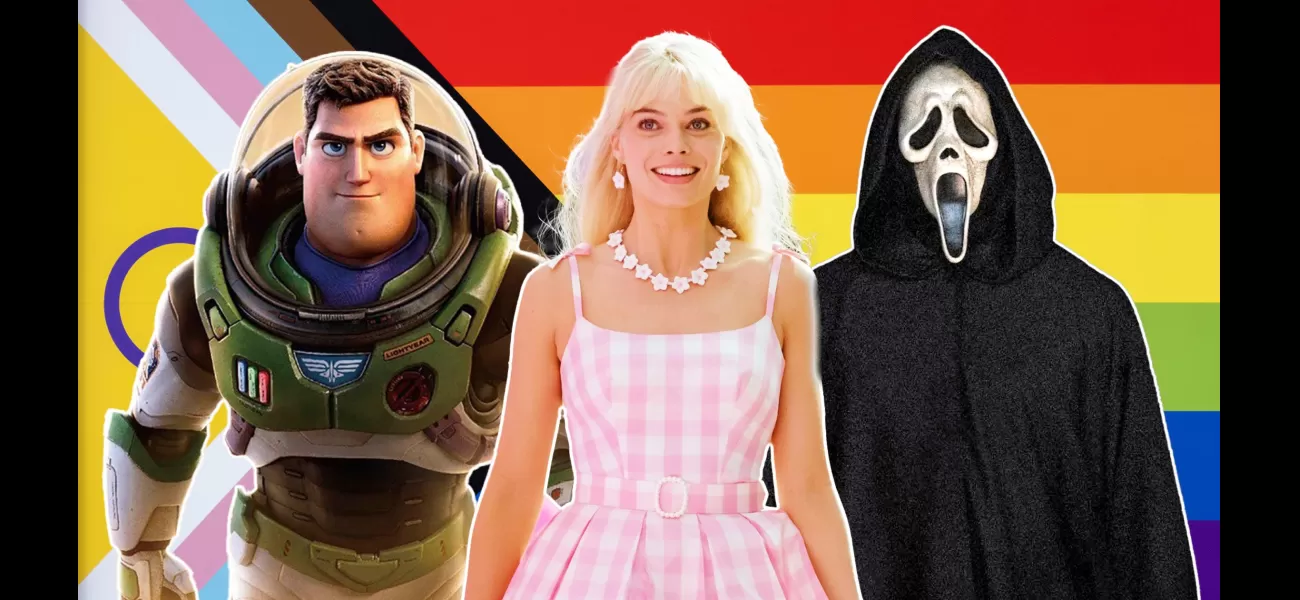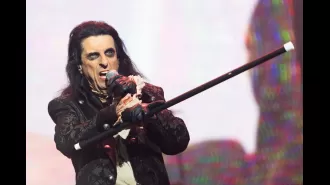9 movies banned in other countries for LGBTQ+ scenes - shocking censorship abroad.
These movies are not typically considered part of the LGBTQ+ genre.
June 8th 2024.

Queer icons have emerged in the most unexpected places, especially after facing bizarre bans in the film industry. From classic Disney movies to modern Pride masterpieces, cinema has consistently provided a nuanced look into the lives of the LGBTQ+ community. Over the span of 100 years, films have not only helped preserve the history of this community, but also challenged the prejudices faced by individuals with diverse identities.
Unfortunately, despite the progress made, there is still a deep-rooted hatred towards the LGBTQ+ community in society. This can be seen through the numerous bans placed on films that simply address LGBTQ+ themes or feature actors who identify as Queer. Movies like the Elton John biopic Rocketman, the cowboy epic Brokeback Mountain, and the gay teen romance Call Me By Your Name have all been banned in various countries for championing LGBTQ+ lives. But it's not just these types of films that have faced censorship.
Even movies that may not immediately be associated with LGBTQ+ themes have found themselves banned or heavily censored due to the same reasons. Here are 9 films that were bizarrely banned for their LGBTQ+ themes – from beloved Disney classics to a popular horror movie.
One example is the animated film Spider-Man: Across The Spider-Verse, which was banned in the United Arab Emirates and Saudi Arabia. Many fans believe that the reason for its ban was due to one scene featuring a transgender pride flag with the slogan "Protect Trans Lives" on a bedroom wall. The film explores the character of Gwen Stacy, voiced by Hailee Steinfeld, whom many viewers interpreted as a trans-coded character. However, her identity is never explicitly stated in the franchise. Despite this, the film was still banned in some countries.
Another surprising example is the beloved children's movie Barbie, which was banned in Kuwait and Lebanon. The film was accused of promoting homosexuality and sexual transformation, with officials claiming that it goes against their moral and religious values. Even the popular Toy Story spin-off Lightyear, focusing on the character of Buzz Lightyear, faced bans in the United Arab Emirates, Kuwait, and Malaysia for featuring LGBTQ+ characters and themes.
The second Doctor Strange film, Doctor Strange In The Multiverse Of Madness, was also banned in Saudi Arabia for including a gay character. Actor Benedict Cumberbatch, who plays the titular character, was disappointed by this decision and spoke out against repressive regimes and their lack of tolerance towards the LGBTQ+ community. Similarly, the highly-anticipated Marvel movie Eternals faced bans in numerous countries across the Gulf due to one scene featuring the MCU's first openly gay superhero.
Despite these bans, it's heartwarming to see that filmmakers are making efforts to include LGBTQ+ representation in their movies. Taika Waititi, who voiced a character in Eternals, expressed his support for the inclusion of same-sex love stories in films and hopes that one day, it won't even be a talking point. These bans only serve as a reminder of the progress that still needs to be made towards normalizing love in all its forms. Let's hope that in the future, films featuring LGBTQ+ themes and characters will no longer face such bizarre censorship.
In the world of cinema, LGBTQ+ themes have always been a source of fascination and controversy. From Queer-coded films to modern Pride masterpieces, the portrayal of LGBTQ+ lives has been a constant presence on the big screen. For over 100 years, films have not only preserved the history of the community but also challenged the prejudices facing people of varying identities.
But unfortunately, this hatred and discrimination are still ingrained in our society. Many films have been banned or heavily censored across the world simply for addressing LGBTQ+ themes. Even having actors who identify as Queer can result in a ban. It's a sad reality that even in the 21st century, films like Elton John biopic Rocketman, cowboy epic Brokeback Mountain, and gay teen romance Call Me By Your Name face bans in various countries for championing LGBTQ+ lives.
It's not just the obvious LGBTQ+ films that have faced bans. Many other films that you wouldn't immediately associate with the community have found themselves in the same situation. Here are 9 films that were bizarrely banned for their LGBTQ+ themes, ranging from Disney classics to a horror hit.
Spider-Man: Across The Spider-Verse faced bans in the United Arab Emirates and Saudi Arabia. Fans believed it was due to a scene where a transgender pride flag can be seen on a bedroom wall with the slogan "Protect Trans Lives". While the exact reason for the ban was not stated, it is believed that it was because the character of Gwen Stacy, voiced by Hailee Steinfeld, is interpreted as trans-coded. Her character's dimension features the colors of the trans flag, but she has not explicitly been identified as a transgender character in the franchise.
Even Barbie, a beloved childhood icon, faced bans in Kuwait and Lebanon for "promoting homosexuality and sexual transformation". The Lebanese culture minister stated that the film "contradicts values of faith and morality" and goes against moral and religious values. The Kuwaiti Ministry of Information also banned the film for featuring a map with a nine-dash line, used to represent China's territorial claims in the South China Sea.
The Toy Story spin-off Lightyear, focusing on Chris Evans' Buzz Lightyear, was banned in the United Arab Emirates, Kuwait, and Malaysia for introducing an LGBTQ+ character. The movie features a sweet romance between Uzo Aduba's Alisha Hawthorne and Kiko, which led to the film not being released in these countries. The UAE's Media Regulatory Office did not give a specific reason for the ban, but it violated the country's media content standards, and same-sex sexual activity between adults is criminalized.
The second Doctor Strange film, Doctor Strange In The Multiverse Of Madness, was banned in Saudi Arabia for including a gay character. The introduction of America Chavez, played by Xochitl Gomez, who is gay, was met with criticism from the film's star Benedict Cumberbatch. He called out the repressive regimes for their lack of tolerance and emphasized the importance of including characters from different backgrounds.
The MCU's first openly gay superhero also faced bans in many Gulf countries in Eternals. One scene shows the character Phastos and his on-screen husband Ben sharing a passionate kiss. Saudi Arabia, Qatar, and Kuwait all banned the film, despite Marvel rejecting requests to edit the scene. It's a clear indication that LGBTQ+ representation is still not accepted by some parts of the world.
It's disheartening to see that even in the world of entertainment, where we seek escapism and representation, discrimination and bans based on sexual orientation and gender identity are still prevalent. But as Taika Waititi, who voiced Mo Morrison in the film, said, "Love is love," and it's time for society to normalize it. As we strive towards a more inclusive and accepting world, steps like including LGBTQ+ characters in films should be celebrated, not banned.
Unfortunately, despite the progress made, there is still a deep-rooted hatred towards the LGBTQ+ community in society. This can be seen through the numerous bans placed on films that simply address LGBTQ+ themes or feature actors who identify as Queer. Movies like the Elton John biopic Rocketman, the cowboy epic Brokeback Mountain, and the gay teen romance Call Me By Your Name have all been banned in various countries for championing LGBTQ+ lives. But it's not just these types of films that have faced censorship.
Even movies that may not immediately be associated with LGBTQ+ themes have found themselves banned or heavily censored due to the same reasons. Here are 9 films that were bizarrely banned for their LGBTQ+ themes – from beloved Disney classics to a popular horror movie.
One example is the animated film Spider-Man: Across The Spider-Verse, which was banned in the United Arab Emirates and Saudi Arabia. Many fans believe that the reason for its ban was due to one scene featuring a transgender pride flag with the slogan "Protect Trans Lives" on a bedroom wall. The film explores the character of Gwen Stacy, voiced by Hailee Steinfeld, whom many viewers interpreted as a trans-coded character. However, her identity is never explicitly stated in the franchise. Despite this, the film was still banned in some countries.
Another surprising example is the beloved children's movie Barbie, which was banned in Kuwait and Lebanon. The film was accused of promoting homosexuality and sexual transformation, with officials claiming that it goes against their moral and religious values. Even the popular Toy Story spin-off Lightyear, focusing on the character of Buzz Lightyear, faced bans in the United Arab Emirates, Kuwait, and Malaysia for featuring LGBTQ+ characters and themes.
The second Doctor Strange film, Doctor Strange In The Multiverse Of Madness, was also banned in Saudi Arabia for including a gay character. Actor Benedict Cumberbatch, who plays the titular character, was disappointed by this decision and spoke out against repressive regimes and their lack of tolerance towards the LGBTQ+ community. Similarly, the highly-anticipated Marvel movie Eternals faced bans in numerous countries across the Gulf due to one scene featuring the MCU's first openly gay superhero.
Despite these bans, it's heartwarming to see that filmmakers are making efforts to include LGBTQ+ representation in their movies. Taika Waititi, who voiced a character in Eternals, expressed his support for the inclusion of same-sex love stories in films and hopes that one day, it won't even be a talking point. These bans only serve as a reminder of the progress that still needs to be made towards normalizing love in all its forms. Let's hope that in the future, films featuring LGBTQ+ themes and characters will no longer face such bizarre censorship.
In the world of cinema, LGBTQ+ themes have always been a source of fascination and controversy. From Queer-coded films to modern Pride masterpieces, the portrayal of LGBTQ+ lives has been a constant presence on the big screen. For over 100 years, films have not only preserved the history of the community but also challenged the prejudices facing people of varying identities.
But unfortunately, this hatred and discrimination are still ingrained in our society. Many films have been banned or heavily censored across the world simply for addressing LGBTQ+ themes. Even having actors who identify as Queer can result in a ban. It's a sad reality that even in the 21st century, films like Elton John biopic Rocketman, cowboy epic Brokeback Mountain, and gay teen romance Call Me By Your Name face bans in various countries for championing LGBTQ+ lives.
It's not just the obvious LGBTQ+ films that have faced bans. Many other films that you wouldn't immediately associate with the community have found themselves in the same situation. Here are 9 films that were bizarrely banned for their LGBTQ+ themes, ranging from Disney classics to a horror hit.
Spider-Man: Across The Spider-Verse faced bans in the United Arab Emirates and Saudi Arabia. Fans believed it was due to a scene where a transgender pride flag can be seen on a bedroom wall with the slogan "Protect Trans Lives". While the exact reason for the ban was not stated, it is believed that it was because the character of Gwen Stacy, voiced by Hailee Steinfeld, is interpreted as trans-coded. Her character's dimension features the colors of the trans flag, but she has not explicitly been identified as a transgender character in the franchise.
Even Barbie, a beloved childhood icon, faced bans in Kuwait and Lebanon for "promoting homosexuality and sexual transformation". The Lebanese culture minister stated that the film "contradicts values of faith and morality" and goes against moral and religious values. The Kuwaiti Ministry of Information also banned the film for featuring a map with a nine-dash line, used to represent China's territorial claims in the South China Sea.
The Toy Story spin-off Lightyear, focusing on Chris Evans' Buzz Lightyear, was banned in the United Arab Emirates, Kuwait, and Malaysia for introducing an LGBTQ+ character. The movie features a sweet romance between Uzo Aduba's Alisha Hawthorne and Kiko, which led to the film not being released in these countries. The UAE's Media Regulatory Office did not give a specific reason for the ban, but it violated the country's media content standards, and same-sex sexual activity between adults is criminalized.
The second Doctor Strange film, Doctor Strange In The Multiverse Of Madness, was banned in Saudi Arabia for including a gay character. The introduction of America Chavez, played by Xochitl Gomez, who is gay, was met with criticism from the film's star Benedict Cumberbatch. He called out the repressive regimes for their lack of tolerance and emphasized the importance of including characters from different backgrounds.
The MCU's first openly gay superhero also faced bans in many Gulf countries in Eternals. One scene shows the character Phastos and his on-screen husband Ben sharing a passionate kiss. Saudi Arabia, Qatar, and Kuwait all banned the film, despite Marvel rejecting requests to edit the scene. It's a clear indication that LGBTQ+ representation is still not accepted by some parts of the world.
It's disheartening to see that even in the world of entertainment, where we seek escapism and representation, discrimination and bans based on sexual orientation and gender identity are still prevalent. But as Taika Waititi, who voiced Mo Morrison in the film, said, "Love is love," and it's time for society to normalize it. As we strive towards a more inclusive and accepting world, steps like including LGBTQ+ characters in films should be celebrated, not banned.
[This article has been trending online recently and has been generated with AI. Your feed is customized.]
[Generative AI is experimental.]
0
0
Submit Comment





